Electoral history of Jean Chrétien
This article is the Electoral history of Jean Chrétien, the twentieth Prime Minister of Canada.
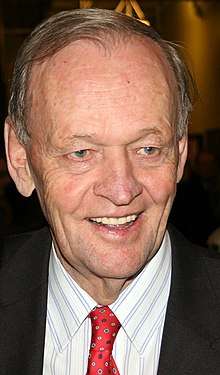
A liberal, Chrétien served three terms as Prime Minister (1993 to 2003), having decisively defeated Prime Minister Kim Campbell in the 1993 general election. He was the first prime minister to win three consecutive majority governments since Sir Wilfrid Laurier.
Chrétien led the Liberal Party of Canada in three general elections (1993, 1997 and 2000). He resigned the party leadership in 2003 and was succeeded by Paul Martin.
Chrétien stood for election to the House of Commons of Canada twelve times and was elected each time (eleven general elections and one by-election). He served continuously in the House from 1963 to 1986, when he resigned over disagreements with Liberal leader John Turner. After winning the Liberal leadership in 1990, he re-entered the Commons by a by-election, and was re-elected three more times, until he retired in 2004.
Chrétien stood for election as leader of the Liberal Party twice. He lost in 1984 to Turner, but he won in 1990, succeeding Turner as Liberal leader.
Summary
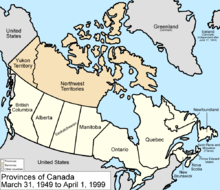
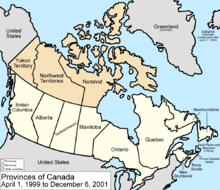
Chrétien ranks fifth out of twenty-three prime ministers for time in office, serving one term of ten years and thirty-eight days.[1]
Chrétien was the sixth of eight prime ministers from Quebec, the others being Sir John Abbott, Sir Wilfrid Laurier, Louis St. Laurent, Pierre Trudeau, Brian Mulroney, Paul Martin and Justin Trudeau. He was also the fourth of five francophone prime ministers, the others being Laurier, St. Laurent, Pierre Trudeau, and Justin Trudeau.
A lawyer, Chrétien got involved in politics at an early age. He was first elected to the House of Commons at age 30, in the federal election of 1963. He was appointed to Cabinet by Prime Minister Lester Pearson in 1967 and remained in Cabinet until 1984 under Prime Ministers Pierre Trudeau and John Turner (except for the short Clark government (1979–80)).[2][3]
Chrétien led the Liberals in three general elections, winning each time. He is the first prime minister since Sir Wilfrid Laurier to win three back-to-back majority governments.
Chrétien stood for election to the House of Commons twelve times, all but once for the riding of Saint-Maurice, which included his home town of Shawinigan. He won more than a majority of the votes in all but two elections, and often had strong majorities. Chrétien was a Member of Parliament from 1963 to 1986, when he resigned over disagreements with Liberal leader John Turner.[3] In 1990, after winning the Liberal leadership, he was elected to the Commons in a by-election for the riding of Beauséjour in New Brunswick. He was re-elected in Saint-Maurice in the next three elections, until he retired in 2004. His total service in Parliament was 35 years, 10 months, and 25 days.
Chrétien stood for election as leader of the Liberal Party twice, in 1984 and 1990. In 1984, he came in second, behind Turner. In 1990, after Turner's resignation, he won the leadership against his principal opponent, Paul Martin. Although Chrétien was successful in leading the party in three general elections, Martin and his supporters gradually undercut Chrétien's leadership, leading to Chrétien's retirement late in 2003. He was succeeded by Martin as prime minister and Liberal leader.[3]
Chrétien remained a Member of Parliament until the 2004 general election, when he retired from politics.
Federal general elections: 1993, 1997, and 2000
Chrétien led the Liberal Party in three general elections: 1993, 1997 and 2000. He won majority governments each time.
Federal election, 1993
In his first general election as leader, Chrétien won a majority government and in the process reduced the Progressive Conservatives from a majority to just two seats in the Commons.
| Party | Leaders | Seats Won | Popular Vote | |
|---|---|---|---|---|
| Liberal | Jean Chrétien1 | 177 | 41.2% | |
| Bloc Québécois | Lucien Bouchard2 | 54 | 13.5% | |
| Reform | Preston Manning | 52 | 18.7% | |
| New Democratic Party | Audrey McLaughlin | 9 | 6.9% | |
| Progressive Conservative | Kim Campbell3 | 2 | 16.0% | |
| Independent | – | 1 | 0.7% | |
| Total | 295 | 97.0%4 | ||
| Sources: Library of Parliament – History of Federal Ridings since 1867 | ||||
1 Leader of the Opposition when election was called; Prime Minister after election.
2 Leader of a third party when election was called; Leader of the Opposition after the election.
3 Prime Minister when election was called; not a Member of Parliament after the election.
4 Table does not include parties which received votes but did not elect any members.
Federal election, 1997
In his second general election, Chrétien again won a majority government, albeit with a reduced number of seats, against a fractured set of opposition parties.
| Party | Leaders | Seats Won | Popular Vote | |
|---|---|---|---|---|
| Liberal | Jean Chrétien1 | 155 | 38.5% | |
| Reform | Preston Manning2 | 60 | 19.4% | |
| Bloc Québécois | Gilles Duceppe3 | 44 | 10.7% | |
| New Democratic Party | Alexa McDonough | 21 | 11.1% | |
| Progressive Conservative | Jean Charest | 20 | 18.8% | |
| Independent | – | 1 | 0.5% | |
| Total | 301 | 99.0%4 | ||
| Sources: Library of Parliament – History of Federal Ridings since 1867 | ||||
1 Prime Minister when election was called; Prime Minister after election.
2 Leader of a third party when election was called; Leader of the Opposition after the election.
3 Leader of the Opposition when election was called; leader of a third party after the election.
4 Table does not include parties which received votes but did not elect any members.
Federal election, 2000
In his third general election, Chrétien won another majority government with an increased number of seats, against a number of opposition parties.
| Party | Leaders | Seats Won | Popular Vote | |
|---|---|---|---|---|
| Liberal | Jean Chrétien1 | 172 | 40.9% | |
| Canadian Alliance | Stockwell Day2 | 66 | 25.5% | |
| Bloc Québécois | Gilles Duceppe | 38 | 10.7% | |
| New Democratic Party | Alexa McDonough | 13 | 8.5% | |
| Progressive Conservative | Joe Clark | 12 | 12.2% | |
| Total | 301 | 97.8%3 | ||
| Sources: Library of Parliament – History of Federal Ridings since 1867 | ||||
1 Prime Minister when election was called; Prime Minister after election.
2 Leader of the Opposition when election was called; Leader of the Opposition after the election.
3 Table does not include parties which received votes but did not elect any members.
Federal constituency elections: 1963 to 1984; 1990 to 2000
Chrétien stood for election to the House of Commons twelve times. He was elected each time, often with substantial majorities.
1963 Federal Election: Saint-Maurice—Laflèche
| Party | Candidate | Popular Vote | % | |
|---|---|---|---|---|
| Liberal | 16,358 | 45.7% | ||
| Social Credit | X Gérard Lamy | 14,414 | 40.3% | |
| Progressive Conservative | Bruno Pellerin | 3,018 | 8.4% | |
| New Democratic Party | Martial La Forest | 1,983 | 5.5% | |
| Total | 35,773 | 99.9%1 | ||
| Source: Library of Parliament – History of Federal Ridings since 1867: Saint-Maurice—Laflèche | ||||
![]()
X Incumbent.
1 Rounding error.
1965 Federal Election: Saint-Maurice—Laflèche
| Party | Candidate | Popular Vote | % | |
|---|---|---|---|---|
| Liberal | 14,395 | 44.1% | ||
| Ralliement créditiste | Alphonse Poulin | 7,429 | 22.8% | |
| New Democratic Party | C. Liddle | 5,669 | 17.4% | |
| Progressive Conservative | Louis Lizotte | 5,115 | 15.7% | |
| Total | 32,608 | 100.0% | ||
| Source: Library of Parliament – History of Federal Ridings since 1867: Saint-Maurice—Laflèche | ||||
![]()
X Incumbent.
The riding of Saint-Maurice—Laflèche was abolished in the re-distribution of 1966.
1968 Federal Election: Saint-Maurice
| Party | Candidate | Popular Vote | % | |
|---|---|---|---|---|
| Liberal | 13,895 | 44.5% | ||
| Ralliement créditiste | Alphonse Poulin | 12,198 | 39.1% | |
| Progressive Conservative | Guy Germain | 4,570 | 14.6% | |
| New Democratic Party | Jean-Guy LaLancette | 550 | 1.8% | |
| Total | 31,213 | 100.0% | ||
| Source: Library of Parliament – History of Federal Ridings since 1867: Saint-Maurice | ||||
![]()
X Incumbent.
1972 Federal Election: Saint-Maurice
| Party | Candidate | Popular Vote | % | |
|---|---|---|---|---|
| Liberal | 19,840 | 56.7% | ||
| Social Credit | Guy Germain | 11,363 | 32.5% | |
| Progressive Conservative | Antonio Genest | 2,227 | 6.4% | |
| New Democratic Party | Robert McLeod | 1,032 | 2.9% | |
| Non-affiliated | Pierre Drolet | 552 | 1.6% | |
| Total | 35,014 | 100.1%1 | ||
| Source: Library of Parliament – History of Federal Ridings since 1867: Saint-Maurice | ||||
![]()
X Incumbent.
1 Rounding error.
1974 Federal Election: Saint-Maurice
| Party | Candidate | Popular Vote | % | |
|---|---|---|---|---|
| Liberal | 20,465 | 65.3% | ||
| Social Credit | Antonio Genest | 5,471 | 17.4% | |
| Progressive Conservative | Richard Durand | 3,501 | 11.2% | |
| New Democratic Party | Claude De Carufel | 1,442 | 4.6% | |
| Non-affiliated | Pierre Rousseau | 482 | 1.5% | |
| Total | 31,361 | 100.0% | ||
| Source: Library of Parliament – History of Federal Ridings since 1867: Saint-Maurice | ||||
![]()
X Incumbent.
1979 Federal Election: Saint-Maurice
| Party | Candidate | Popular Vote | % | |
|---|---|---|---|---|
| Liberal | 27,243 | 71.1% | ||
| Social Credit | Pierre-André Hamel | 6,837 | 17.8% | |
| Progressive Conservative | Roger Armand Charbonneau | 2,795 | 7.3% | |
| New Democratic Party | Robert Deschamps | 952 | 2.5% | |
| Union populaire | Pierre Chénard | 351 | 0.9% | |
| Marxist–Leninist | Normand Beaudoin | 160 | 0.4% | |
| Total | 38,338 | 100.0% | ||
| Source: Library of Parliament – History of Federal Ridings since 1867: Saint-Maurice | ||||
![]()
X Incumbent.
1980 Federal Election: Saint-Maurice
| Party | Candidate | Popular Vote | % | |
|---|---|---|---|---|
| Liberal | 27,356 | 76.7% | ||
| Progressive Conservative | Roger Armand Charbonneau | 2,516 | 7.1% | |
| Social Credit | Normand LaFrenière | 2,369 | 6.6% | |
| New Democratic Party | Edgar Paquette | 1,963 | 5.5% | |
| Rhinoceros | J. F. le Calife De Vernal | 1,206 | 3.4% | |
| Union populaire | Lionel C. LaPorte | 161 | 0.5% | |
| Marxist–Leninist | Normand Beaudoin | 95 | 0.3% | |
| Total | 35,666 | 100.1%1 | ||
| Source: Library of Parliament – History of Federal Ridings since 1867: Saint-Maurice | ||||
![]()
X Incumbent.
1 Rounding error.
1984 Federal Election: Saint-Maurice
| Party | Candidate | Popular Vote | % | |
|---|---|---|---|---|
| Liberal | 24,050 | 58.9% | ||
| Progressive Conservative | Roger Armand Charbonneau | 14,468 | 35.4% | |
| New Democratic Party | Danielle Delbeque | 1,433 | 3.5% | |
| Parti nationaliste du Québec | Alain Déry | 892 | 2.2% | |
| Total | 40,843 | 100.0% | ||
| Source: Library of Parliament – History of Federal Ridings since 1867: Saint-Maurice | ||||
![]()
X Incumbent.
Note: Chrétien resigned his seat effective February 27, 1986.
1990 Federal By-Election: Beauséjour
The incumbent, Fernand Robichaud, resigned his seat on September 24, 1990, after Chrétien was elected party leader, to allow Chrétien an opportunity to enter the House of Commons.
| Party | Candidate | Popular Vote | % | |
|---|---|---|---|---|
| Liberal | 17,332 | 51.5% | ||
| New Democratic Party | Guy Cormier | 12,587 | 37.4% | |
| Confederation of Regions | Margie Bowes-Legood | 2,783 | 8.3% | |
| Independent | Alonzo LeBlanc | 450 | 1.3% | |
| Christian Heritage | May Boudreau-Padersen | 286 | 0.8% | |
| Rhinoceros | Bryan Gold | 246 | 0.7% | |
| Total | 33,684 | 100.0% | ||
| Source: Library of Parliament – History of Federal Ridings since 1867: Beauséjour | ||||
![]()
1993 Federal Election: Saint-Maurice
| Party | Candidate | Popular Vote | % | |
|---|---|---|---|---|
| Liberal | 25,200 | 54.1% | ||
| Bloc Québécois | Claude Rompré | 18,896 | 40.5% | |
| Progressive Conservative | Pauline B. Daneault | 1,909 | 4.1% | |
| Natural Law | Christian Simard | 372 | 0.8% | |
| New Democratic Party | Robert Des Champs | 236 | 0.5% | |
| Total | 46,613 | 100.0% | ||
| Source: Library of Parliament – History of Federal Ridings since 1867: Saint-Maurice | ||||
![]()
1997 Federal Election: Saint-Maurice
| Party | Candidate | Popular Vote | % | |
|---|---|---|---|---|
| Liberal | 22,266 | 47.3% | ||
| Bloc Québécois | Yves Duhaime | 20,664 | 43.9% | |
| Progressive Conservative | Denis Vincent | 3,657 | 7.8% | |
| New Democratic Party | Eric Hébert | 489 | 1.0% | |
| Total | 47,076 | 100.0% | ||
| Source: Library of Parliament – History of Federal Ridings since 1867: Saint-Maurice | ||||
![]()
X Incumbent.
2000 Federal Election: Saint-Maurice
| Party | Candidate | Popular Vote | % | |
|---|---|---|---|---|
| Liberal | 23,345 | 54.1% | ||
| Bloc Québécois | François Marchand | 16,821 | 39.0% | |
| Canadian Alliance | Jean-Guy Mercier | 1,461 | 3.4% | |
| Progressive Conservative | Pierre Blais | 966 | 2.2% | |
| New Democratic Party | Raymond Chase | 359 | 0.8% | |
| Communist | Sylvain Archambault | 223 | 0.5% | |
| Total | 43,175 | 100.0% | ||
| Source: Library of Parliament – History of Federal Ridings since 1867: Saint-Maurice | ||||
![]()
X Incumbent.
Liberal Party Leadership Conventions: 1984, 1990
Chrétien contested the Liberal leadership twice. He lost in 1984 to Turner, who then led the Liberal party in the next two general elections. Turner retired after the loss in the 1988 general election, and Chrétien won the leadership convention held in 1990.
1984 Leadership Convention
Trudeau announced his retirement early in 1984. Chrétien entered the leadership election but lost on the second ballot to Turner.
| Candidate | First Ballot | Second Ballot | |||
|---|---|---|---|---|---|
| Votes cast | % | Votes cast | % | ||
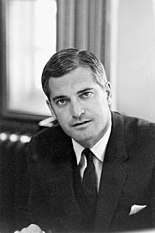 |
John Turner | 1,593 | 46.4% | 1,862 | 54.4% |
 |
Jean Chrétien | 1,067 | 31.1% | 1,368 | 40.0% |
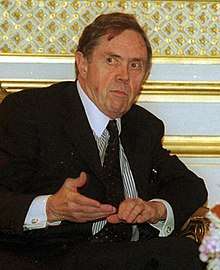 |
Don Johnston | 278 | 8.1% | 192 | 5.6% |
| John Roberts | 185 Withdrew after first ballot. |
5.4% | – | – | |
| Mark MacGuigan | 135 Withdrew after first ballot. |
3.9% | – | – | |
| John Munro | 93 Withdrew after first ballot. |
2.7% | – | – | |
| Eugene Whelan | 84 Eliminated after first ballot. |
2.4% | – | – | |
| Total | 3,435 | 100.0% | 3,422 | 100.0% | |
| Source: CPAC – 1984 Liberal Convention | |||||
1990 Leadership Convention
Following the Liberal defeat in the 1988 general election, Turner announced his retirement. At the leadership convention held in 1990, Chrétien won on the first ballot, defeating his principal opponent, Paul Martin.
| Candidate | First Ballot | ||||||||||
|---|---|---|---|---|---|---|---|---|---|---|---|
| Votes cast | % | ||||||||||
 |
Jean Chrétien | 2,652 | 56.9% | ||||||||
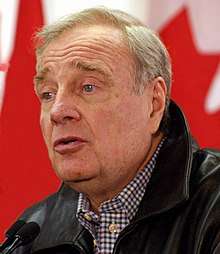 |
Paul Martin | 1,176 | 25.2% | ||||||||
| Sheila Copps | 499 | 10.7% | |||||||||
| Tom Wappel | 267 | 5.7% | |||||||||
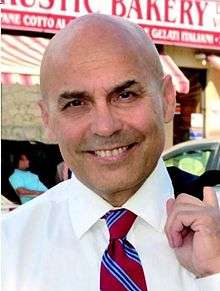 |
John Nunziata | 64 | 1.4% | ||||||||
| Total | 4,658 | 99.9%1 | |||||||||
| Source: CPAC – 1990 Liberal Leadership Convention | |||||||||||
1 Rounding error.
See also
- Electoral history of Kim Campbell - Chrétien's predecessor as Prime Minister.
- Electoral history of John Turner - Chrétien's predecessor as leader of the Liberal Party.
- Electoral history of Paul Martin - Chrétien's successor as leader of the Liberal Party and as Prime Minister.